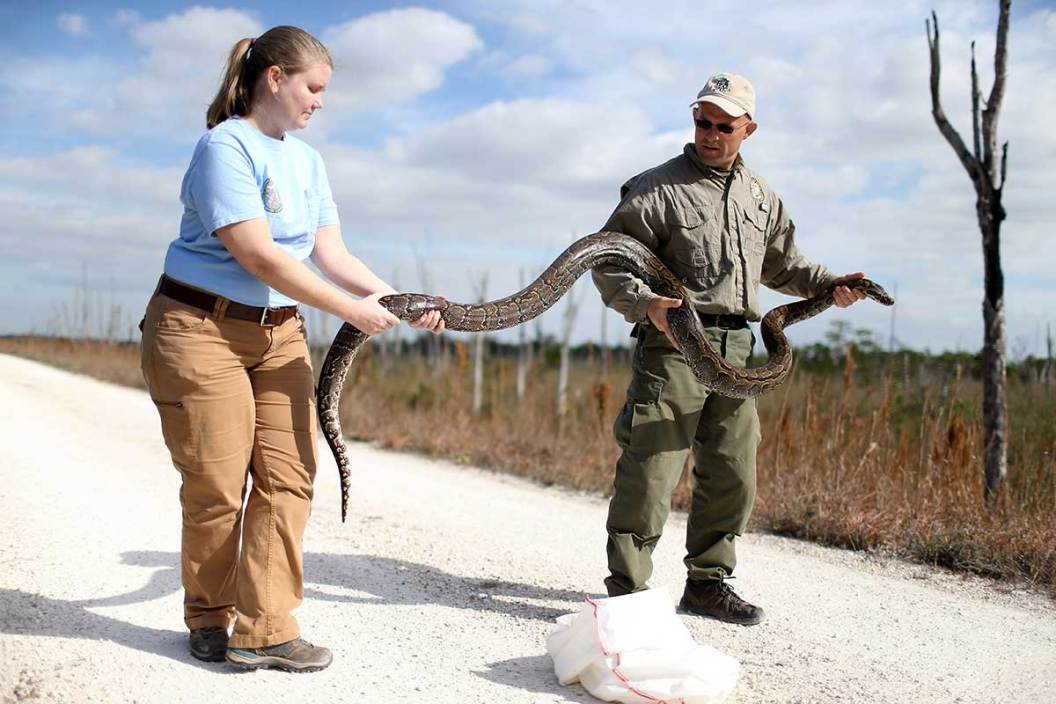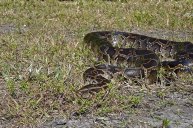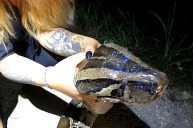Snake hunters are out in full force harvesting as many Burmese pythons as possible from Florida's public lands until Sunday. It is all part of the Florida Python Challenge, a ten-day competition where professional python hunters and amateurs compete to eliminate the invasive snakes from the Everglades. First-place prizes in respective categories for the most pythons and longest snakes removed. A $10,000 grand prize was recently announced and will be awarded to the individual that takes the most snakes overall.
This year's challenge kicked off on August 5 and will wrap up on August 14. Winners will be officially announced at an awards banquet at a later date.
The Florida Python Challenge was initially started to bring attention to invasive Burmese pythons' threat to Florida's unique Everglades ecosystem.
"This competition's main intent is to bring awareness about invasive species issues," said McKayla Spencer, the Interagency Python Management Coordinator for the Florida Fish And Wildlife Conservation Commission. "It does a phenomenal job at that."
Florida's Python Problem
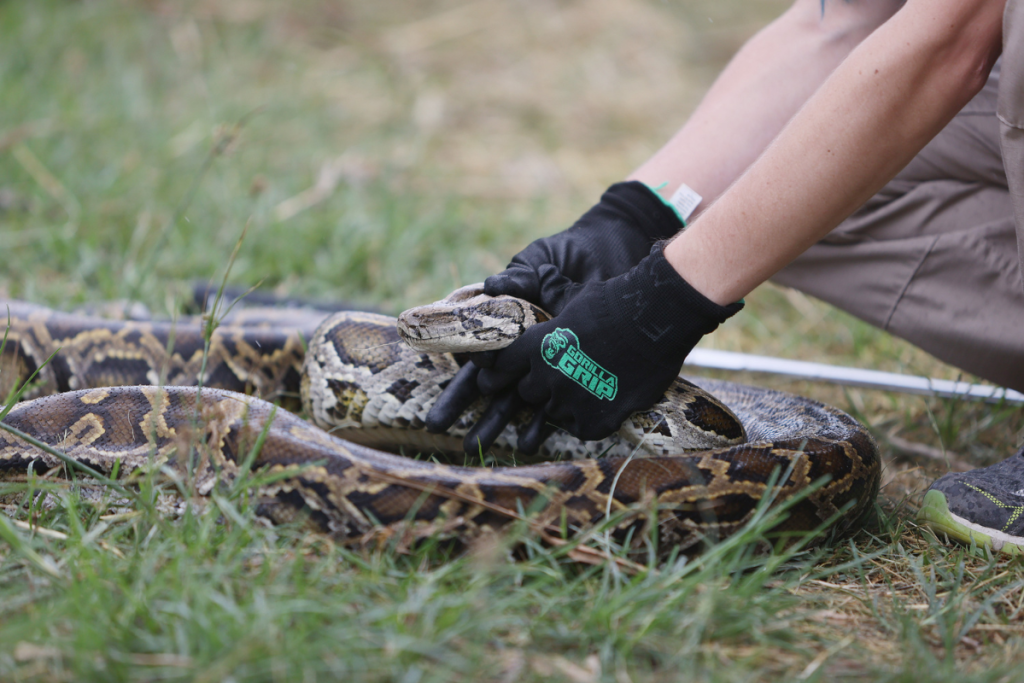
Joe Raedle/Getty Images
These invasive species disrupt Florida's native ecosystems by decimating native prey populations, such as the endangered Key Largo wood rats. They feast on various mammals, birds, and reptiles, even alligators. Burmese pythons have no natural predators, live for more than two decades, and can grow large. Pythons 18 feet long have been harvested from the Everglades. Females can lay clutches of up to 100 eggs in one reproductive cycle.
"Burmese pythons are considered invasive because they are having negative effects on our ecosystem," Spencer told Wide Open Spaces. "They are directly negatively impacting the environment by eating mammals, reptiles, and birds. That is just the direct effect. There are likely many indirect effects that are occurring. That is why we need to control this species."
According to the USGS, severe mammal declines in Everglades National Park have been linked to Burmese pythons. One study reported that populations of raccoons had dropped 99.3 percent, opossums 98.9 percent, and bobcats 87.5 percent since 1997. Marsh rabbits, cottontail rabbits, and foxes have effectively disappeared.
The mammals that have declined most significantly have been regularly found in the stomachs of Burmese pythons removed from Everglades National Park and elsewhere in Florida. They can reach huge sizes, allowing them to target more prey that other native snakes could never attempt.
"We regularly pull 10-foot pythons out of the Everglades," Spencer said. "We have no native snake in the entire United States that gets anywhere near that size."
This Year's Florida Python Challenge
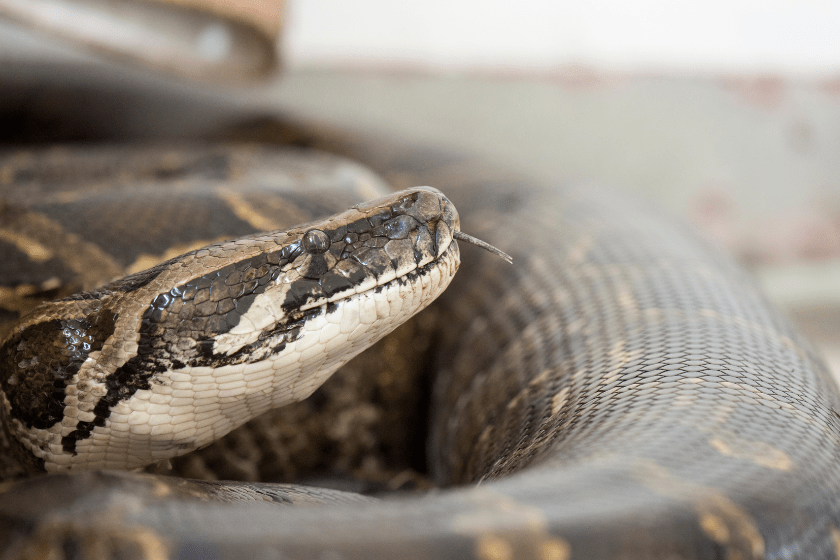
LiCheng Shih, CC BY 2.0, via Wikimedia Commons
The current Florida Python Challenge is the fifth event that has been held. The first was in 2013, then again in 2016, before becoming an annual event in 2019.
In years past, the event was held in July. This year the event runs in August, a timing tweak meant to align the challenge with the Burmese python's hatchling season.
"There were many things that we continued on that were very successful in past years, but we were able to have this a little bit later in the summer than in the past," Spencer said. "What we were able to do with that is hit more of that hatchling season. This means we are able to get more snakes before they grow into adults. We have had quite a few pythons turned into check stations, and we have had quite a few hatchlings represented across some of those snakes that have been turned in."
Spencer said there are currently around 950 participants representing more than thirty states hunting the Everglades for pythons.
To register, participants went to flpythonchallenge.org and filled out a form. There is a $25 fee, and all participants must take the easily-accessible and required online training. Participants can also view the optional training page, which includes additional tools to help search for and safely capture pythons.
Pythons must be humanely killed and turned in dead. Participants face disqualification if they turn in pythons killed inhumanely.
And it doesn't have to stop with the end of the Python Challenge. Hunters can take pythons - without a hunting license or permit - year-round on 25 of the Florida Wildlife Commission's managed public lands in South Florida, according to Executive Order 20-17.
"The negative effects of these invasive pythons are very bad," Spencer said. "On top of that, they are very good at hiding. Their detection rates are less than one percent. They are extremely hard to find. That makes them overall very hard to control or get any real numbers on."
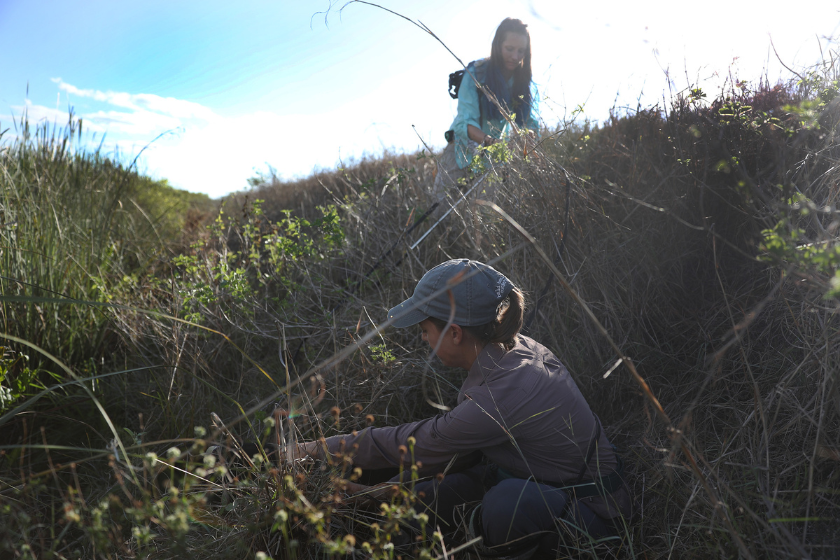
Joe Raedle/Getty Images
The challenge is just part of Florida's overall python management program.
"We are always actively looking at new innovative tools to continue better controlling the species," Spencer said. "We are applying multiple control methods across the landscape. Essentially we are doing everything we can to continue controlling the species and get better at it."
In recent years Florida has increased the number of paid contractors in the python-removal program to approximately 100. Since 2017, contractors have removed more than 10,000 invasive pythons. The state has also recently added the services of scent-detector dogs to sniff out Burmese pythons in the Everglades.
Another technique is scout snakes, tagged male pythons used to track female egg-laying snakes during the breeding season. The recent record-breaking heaviest python was detected using this scout snake method.
The Florida Python Challenge is elevating public understanding of the invasive python problem in a way that Spencer hopes will last beyond the official challenge window.
"Getting the message out and bringing awareness to the python program is exactly what this challenge is designed to do," she said. "We are excited that people are registering and participating and that the challenge is doing what we want it to do."
READ MORE: THE 2022 FLORIDA PYTHON CHALLENGE IS LOOKING FOR SNAKE HUNTERS
